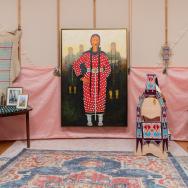The University of Chicago has long championed collaborative research as a promising strategy for addressing complex questions. When the COVID-19 pandemic hit last year, it was not clear how this form of inquiry might need to adapt. What new strategies would humanistic scholars adopt to share, develop and test new ideas online? What empirical data would social scientists be able to gather, and what insights could they glean from fieldwork dramatically constrained by new public health guidelines preventing close physical contact?
The challenges for scholars pursuing humanistic research collaborations at this moment are significant. But the 2021–22 cycle of research projects at the Neubauer Collegium are a clear sign that UChicago faculty remain committed to collaborative modes of inquiry—and creative in their approach to pursuing excellence in research.
“It has been amazing to witness the creativity and resilience of the faculty pursuing cutting-edge research, no matter what,” said Neubauer Collegium Roman Faculty Director Jonathan Lear. “The Neubauer Collegium, the entire staff, is committed to helping these research teams achieve their aims.”
The following projects will launch at the Neubauer Collegium on July 1, 2021:
Climate Games: Transforming Middle School STEM Education Through Transmedia Play
Patrick Jagoda (English and CMS), Kristen Schilt (Sociology), Heidi Coleman (TAPS), Ben Kolak (Truth and Documentary; Independent Filmmaker & Cinematographer), Sandor Weisz (The Mystery League; Puzzle Designer)
This project will create and evaluate an “Alternate Reality Game” that engages seventh-grade students from the University of Chicago Laboratory and Charter Schools in a curriculum about climate change and environmental science. The project aims to develop a model that can scale to the level of Chicago Public Schools in a citywide game.
Entanglements of the Indian Past
Andrew Ollett (South Asian Languages & Civilizations), Whitney Cox (South Asian Languages & Civilizations), Sarah Pierce Taylor (Divinity School), Dipesh Chakrabarty (History), Anand Venkatkrishnan (Divinity School)
The research team on this project will run a three-year series of interdisciplinary workshops to chart a future course for the study of the Indian past. The project will focus on three important issues—caste, materiality, and historicality—pairing each issue with a pivotal moment that shaped the course of Indian historiography.
Genomes, Migrations, and Culture in the Early Civilizations of the Middle East
John Novembre (Human Genetics), James Osborne (Oriental Institute & NELC), Maanasa Raghavan (Human Genetics), David Schloen (Oriental Institute & NELC)
This collaboration between archaeologists and geneticists will analyze DNA from ancient human remains excavated in the Middle East in order to reconstruct population movements and assess the prevailing explanations for cultural change in the Bronze Age civilizations of this region. The project will also seek viable ways of conceptualizing the relationship between genetic variation, cultural and linguistic similarities and differences, and the social construction of ethnicity and group solidarity.
Intellectual Histories of Global Capitalism
Paul Cheney (History), Lucas Pinheiro (Political Science)
This project will explore new chronological and thematic frameworks for understanding the hyper-capitalism of the twentieth century. By placing a temporary parenthesis around the economy of the Industrial Revolution and its Fordist offshoots, the project will explore how the early modern economy may shed new light on the rise of global capitalism.
Panafrica: Histories, Aesthetics, Politics
Adom Getachew (Political Science), Antawan Byrd (Art Institute of Chicago), Matthew Witkovsky (Art Institute of Chicago), Elvira Dyangani Ose (The Showroom; Goldsmiths, University of London)
Pan-Africanism has guided independence movements and anticolonial struggles and shaped the terms of advocacy and protest across the globe. This project will convene a series of discussions to explore the relation of that political cause to cultural production and to the humanities. It will serve as a complement to Panafrica: Project a Black Planet, a major exhibition opening at the Art Institute of Chicago in 2024.
Possible and Impossible Fictions
Alison James (Romance Languages & Literatures), Akihiro Kubo (Kwansei Gakuin University), Françoise Lavocat (Université Sorbonne Nouvelle/Institut Universitaire de France)
How does fiction model our understanding of what is possible, and how does our sense of what is possible constrain what is perceived to be possible or impossible in fictional worlds? This project will consider such questions in the context of a global crisis in which our “real-world” conceptions of possibility and predictability are shifting.
Re-Staging the Lakeview Japanese American Neighborhood
Michael Bourdaghs (East Asian Languages & Civilizations), Hoyt Long (East Asian Languages & Civilizations), Chelsea Foxwell (Art History), Thomas Lamarre (CMS), Ryan Yokota (DePaul University), Yu Miri (Independent Scholar, Novelist, & Playwright)
Yu Miri, one of Japan’s most distinguished novelists and playwrights, will come to campus as a Neubauer Collegium Visiting Fellow to collaborate on this project. Yu will develop an archive of oral history interviews with local Japanese Americans on their memories of the community that sprung up in Chicago’s Lakeview neighborhood after the release of some Japanese Americans from wartime concentration camps. That archive will form the basis for a new theatrical performance piece.
Role of the Family and the State in Creating Inequality and Promoting Social Mobility: Linking Social Science and Political Philosophy
Steven Durlauf (Chicago Harris), James Heckman (Economics), Harry Brighouse (University of Wisconsin), Glenn Loury (Brown University), John Roemer (Yale University), Petra Todd (University of Pennsylvania)
This project aims to integrate positive and normative dimensions of the philosophical study of inequality and human flourishing in light of recent developments in the empirical understanding of the origins of inequality and social mobility. The research team will examine how theories of distributive justice should influence the models and data that social scientists analyze when studying inequality and how empirical findings on the determinants of life outcomes should influence philosophical discourse.
Roman Statutes: Renewing Roman Law
Clifford Ando (Classics)
This project will produce the first comprehensive edition of all surviving inscribed legislation from classical Rome. By producing a print edition and an open-access repository of the material, along with introductions, translation, and commentary, the project will make possible the study of the material basis of ancient legal knowledge and the practice of law.
The Quest for Modern Language between the Mediterranean and Black Sea, 1820–1948
Orit Bashkin (NELC), Itamar Francez (Linguistics), Holly Shissler (NELC), Na’ama Rokem (Comparative Literature), Annie Greene (Skidmore College)
Historians, literary scholars, linguists, anthropologists, and sociologists will come together to examine the role of language ideologies in cultural and political discourses in and around the Middle East in the late 19th and early 20th centuries. The group will study the articulation and spread of ideas about language death and revival, language reform, and language modernization in the contexts of empire, emerging nationalisms, and a modernizing world.
Visual Regimes of Enslavement and Their Afterlives
Agnes Lugo-Ortiz (Romance Languages & Literatures), Larissa Brewer-García (Romance Languages & Literatures), Allyson Nadia Field (CMS), Danielle Roper (Romance Languages & Literatures), Chris Taylor (English)
This project will investigate how visual practices fostered during the slaveholding era in the circum-Atlantic world have underwritten or organized contemporary modes of seeing black bodies. The research team will explore the means by which visual regimes of enslavement have been foundational for the contemporary inscription of blackness. The group will also explore the memorialization and preservation of histories of slavery.








